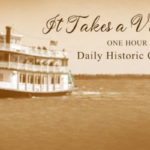
By Christine Edwards
When You Need Help the Most, They’re the First on Scene
The old saying goes, “everyday people can be heroes every day.”
Everyday heroes are your next door neighbors, the man behind you in the checkout lane, and the woman in your spin class. But when they head off to work, they are the firefighters, police officers, and paramedics that respond to your 911 call.
They breathe for people when they can’t do it for themselves. They keep vigil overnight on holidays and weekends when others are safe
at home with their families. They pack sandbags and weather the fiercest hurricanes to evacuate unsafe areas. They deploy to austere locations to rescue brothers and sisters in harm’s way, knowing their lives are at stake just by being in a war torn area. They are there when you need them, no matter the cost.
For over a decade, firefighter and paramedic, Eric Rath, has served Brevard County. His crew consider themselves family and rely on each other to get through emergency calls. Working alongside each other during repeated moments of grave peril creates bonds that don’t fade after the endorphins wane. He recalls that retiring was difficult for a fellow firefighter, because he missed the crew. “I think it will be tough on me too.”
There are definite drawbacks to providing emergency response services. Most heroes don’t have furnished offices or even drab cubicles. Police officers often work out of their squad cars and deployed reservists sometimes live out of their battle rattle.
Emergencies can occur at any time, which rules out nine to five schedules for many responders. When loved ones work long, irregular hours, it can be taxing on their families. One person may wear the uniform, but entire families shoulder the sacrifices that come along with it. The fire rescue schedule is known for being hard on families. Like most firefighters, Eric’s crew works 24-hour shifts. After long days at the firehouse, crew members still have families to care for at home. He was happy to report that Brevard County Fire Rescue adjusts schedules to allow firefighters to be with their families during emergencies, when they’re needed most.
Deputy Sheriff Carmen Minthorn understood the gravity of her chosen profession, but wanted her family to be well informed when she joined the ranks of the Brevard County Sheriff’s Office. Before she swore in, she outlined procedures with her family, should an unforeseen event occur. This candid conversation helped when news stories broke that might have worried her loved ones.
Deputy Sheriff Veronica Quintana and Deputy Minthorn’s squad has the highest female to male ratio in their agency. In addition to the demands of law enforcement, these women care for a total of ten dependents, six of which are children. “We’re gone for holidays and family gatherings and they have to carry on without us,” Deputy Quintana said.
Unparalleled camaraderie between partners, squads, and crews comfort heroes during long hours away from loved ones. “You build close relationships with your partners,” Deputy Minthorn said. “You depend on them to get you home every day.”
TSgt. Benjamin Eatros, an Air Force reservist and student in paramedic training, sought out such a team to work with and that led him to paramedic school. “I wanted to work with other people that felt that way. Both things I do really matter.”
The distance between a deployed environment and home can take a toll on even the most stoic hero and that’s when fellow service members step in to bridge the gap. TSgt Eatros knows he will miss the bonds formed during deployments when he retires. “People will bend over backward for each other. I think it’s going to be hard to find that when I get out.”
Training and preparedness are held in great esteem by our heroes, as they can mean the difference between life and death on scene. Both Deputy Quintana and Deputy Minthorn hold bachelor’s degrees. Deputy Quintana switched career tracks to law enforcement in 2007, and has earned three more degrees and her EMT license.
Deputy Minthorn has attended 20 elective trainings since 2011 and credits them with keeping her up to date on laws and better ways to perform her duties. As a field training officer, she has come full circle and now prepares newly hired officers to take on their positions with the sheriff’s office.
Some heroes wear more than one uniform. The skills learned in one service have desirable effects in others. The lifesaving skills TSgt Eatros learns in paramedic school help him respond faster and more effectively to emergency medical situations outside the schoolhouse. His military training crosses over too, and affords him a competitive edge in his academic career.
“My military bearing sets me apart from others on scene,” said TSgt Eatros. “The military’s discipline and structure will help you succeed in almost any career out there.”
Deputy Quintana also dons two uniforms. With years of emergency calls under her belt, she brings a distinctive calm to crisis situations she may respond to as a First Sergeant in the Air Force Reserve. Her background in law enforcement prepared her for her current position in the military, and her leadership training and supervisory role in the Reserves benefit her when on patrol. “You won’t get that training anywhere else,” she said.
Juggling two demanding careers makes Deputy Quintana sometimes wish she could be in two places at once, but just as often she finds that her professions complement each other. TSgt Eatros shares her sentiments. “When you’re there, it is a hundred miles an hour.” With such demands on him, support at home is a must. He is thankful for the sacrifices his wife makes so he can attend school, work and serve in the Reserves.
The 920th Rescue Wing has the highest ops tempos in the Air Force Reserve Command. The Wing’s Public Relations officer, Maj. Cathleen Snow, remembers the pre-war reserves as being far different than today’s high speed mission.
“The weekend warrior went away after 9/11,” said Maj. Cathleen Snow.
Many airmen from our hometown have multiple deployments under their belts, which can cause strains on their families and civilian employers. Civilian workloads aren’t suspended when reservists are deployed, even though they can’t be in two places simultaneously.
Patrick Air Force Base’s reservists have received an outpouring of appreciation from the Space Coast. Deputy Quintana fondly remembers the return of a deputy sheriff from a deployment to Afghanistan with the 920th. Fellow Sheriff’s officers from every rank met the plane to welcome him home.
Common threads run between our heroes. They are passionate about helping people and love their professions.
They put their lives on the line every time they clock in, but don’t see their efforts as out of the ordinary, because it’s ingrained in them to selflessly help those in need.
“I felt a calling,” Deputy Minthorn said. “And I still do.”
When on duty, heroes are easy to spot. They are the ones charging toward the burning building when everyone else is running in the opposite direction. As community protectors, citizen warriors, and rescuers, these men and women are never really off duty. They are our modest neighbors, our ever vigilant guardians, and our hometown heroes.
This article appears in the May 2015 issue of SpaceCoast Living.
Did you like what you read here? Subscribe to SpaceCoast Living.













